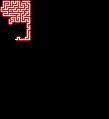2019-12-15 - Oxygen System
(original .ipynb)
Day 15 puzzle input is an IntCode program (mine is here) which controls a droid that should perform some repairs on an oxygen tank. Part 1 involves using the program to explore the surroundings (it's basically a maze), find a destination (an oxygen tank) then find the shortest path to that location. Part 2 involves exploring the maze, then simulating the spread of oxygen through the maze and finding how many time-steps it would take to fill every spot of the maze.
opcode_add = 1
opcode_mul = 2
opcode_read = 3
opcode_write = 4
opcode_jump_true = 5
opcode_jump_false = 6
opcode_lt = 7
opcode_eq = 8
opcode_rebase = 9
opcode_terminate = 99
mode_position = 0
mode_immediate = 1
mode_relative = 2
class IntCodeCpu:
def __init__(self, memory_image):
self.memory = [ x for x in memory_image ] # copy memory image, in case it's reused
self.stalled = True
self.input_buffer = None
self.output_buffer = None
self.pc = 0
self.initialise_opcodes()
self.offset = 0
self.done = False
def start(self, input_buffer, output_buffer, noun=None, verb=None):
self.input_buffer = input_buffer
self.output_buffer = output_buffer
if noun:
self.memory[1] = noun
if verb:
self.memory[2] = verb
return self.run()
def run(self):
instr = self.memory[self.pc]
self.stalled = False
while int(instr) != opcode_terminate and not self.stalled:
(op, modes) = self.decode_instr(instr)
self.pc = op(modes)
instr = self.memory[self.pc]
return self.memory[0]
#-HELPERS-----------------------------
def try_pop_mode(self, modes):
if len(modes) == 0:
return 0
return modes.pop()
def resize_memory(self, target_addr):
self.memory += ([0] * (1 + target_addr - len(self.memory)))
#-DECODE-INSTRUCTIONS-----------------
def initialise_opcodes(self):
self.opcodes = {
opcode_add: self.op_add,
opcode_mul: self.op_mul,
opcode_read: self.op_read,
opcode_write: self.op_write,
opcode_jump_true: self.op_jump_true,
opcode_jump_false: self.op_jump_false,
opcode_lt: self.op_lt,
opcode_eq: self.op_eq,
opcode_rebase: self.op_rebase
}
def decode_instr(self, instr):
instr = str(instr)
opcode = self.decode_op(instr)
modes = self.decode_modes(instr)
if not (opcode in self.opcodes):
raise Exception(f"Invalid opcode {opcode}")
return (self.opcodes[opcode], modes)
def decode_op(self, instr):
if len(instr) > 2:
return int(instr[-2:])
return int(instr)
def decode_modes(self, instr):
if len(instr) > 2:
return [ int(d) for d in instr[:-2]]
return []
#-MICRO-OPS---------------------------
def uop_read(self, value, mode):
if mode == mode_position:
if value >= len(self.memory):
self.resize_memory(value)
return int(self.memory[value])
elif mode == mode_relative:
if self.offset + value >= len(self.memory):
self.resize_memory(self.offset + value)
return int(self.memory[self.offset + value])
elif mode == mode_immediate:
return int(value)
else:
raise Exception("UNKNOWN MODE")
def uop_write(self, dst, value, mode):
if mode == mode_position:
if dst >= len(self.memory):
self.resize_memory(dst)
self.memory[dst] = value
elif mode == mode_relative:
if self.offset + dst >= len(self.memory):
self.resize_memory(self.offset + dst)
self.memory[self.offset + dst] = value
elif mode == mode_immediate:
raise Exception(f"cannot write {value} to literal {dst}")
def uop_cond_jump(self, modes, cond):
param_mode = self.try_pop_mode(modes)
param_raw = int(self.memory[self.pc + 1])
param = self.uop_read(param_raw, param_mode)
dest_mode = self.try_pop_mode(modes)
dest_raw = int(self.memory[self.pc + 2])
dest = self.uop_read(dest_raw, dest_mode)
if cond(param):
return dest
return self.pc + 3
def uop_cmp(self, modes, cmp):
param0_mode = self.try_pop_mode(modes)
param0_raw = int(self.memory[self.pc + 1])
param0 = self.uop_read(param0_raw, param0_mode)
param1_mode = self.try_pop_mode(modes)
param1_raw = int(self.memory[self.pc + 2])
param1 = self.uop_read(param1_raw, param1_mode)
dest_mode = self.try_pop_mode(modes)
dest = int(self.memory[self.pc + 3])
if cmp(param0, param1):
self.uop_write(dest, 1, dest_mode)
else:
self.uop_write(dest, 0, dest_mode)
return self.pc + 4
#-OPCODES-----------------------------
def op_add(self, modes):
arg0_mode = self.try_pop_mode(modes)
arg1_mode = self.try_pop_mode(modes)
dest_mode = self.try_pop_mode(modes)
arg0_raw = int(self.memory[self.pc + 1])
arg1_raw = int(self.memory[self.pc + 2])
dest = int(self.memory[self.pc + 3])
arg0 = self.uop_read(arg0_raw, arg0_mode)
arg1 = self.uop_read(arg1_raw, arg1_mode)
self.uop_write(dest, str(int(arg0) + int(arg1)), dest_mode)
return self.pc + 4
def op_mul(self, modes):
arg0_mode = self.try_pop_mode(modes)
arg1_mode = self.try_pop_mode(modes)
dest_mode = self.try_pop_mode(modes)
arg0_raw = int(self.memory[self.pc + 1])
arg1_raw = int(self.memory[self.pc + 2])
dest = int(self.memory[self.pc + 3])
arg0 = self.uop_read(arg0_raw, arg0_mode)
arg1 = self.uop_read(arg1_raw, arg1_mode)
self.uop_write(dest, str(int(arg0) * int(arg1)), dest_mode)
return self.pc + 4
def op_read(self, modes):
dest_mode = self.try_pop_mode(modes)
dest = int(self.memory[self.pc + 1])
# if the input buffer is empty, we should "stall" and
# resume later
if not self.input_buffer:
self.stalled = True
return self.pc
val = self.input_buffer.pop()
self.uop_write(dest, str(val), dest_mode)
return self.pc + 2
def op_write(self, modes):
src_mode = self.try_pop_mode(modes)
src_raw = int(self.memory[self.pc + 1])
src = self.uop_read(src_raw, src_mode)
self.output_buffer.append(src)
return self.pc + 2
def op_jump_true(self, modes):
return self.uop_cond_jump(modes, lambda x: x != 0)
def op_jump_false(self, modes):
return self.uop_cond_jump(modes, lambda x: x == 0)
def op_lt(self, modes):
return self.uop_cmp(modes, lambda x, y: x < y)
def op_eq(self, modes):
return self.uop_cmp(modes, lambda x, y: x == y)
def op_rebase(self, modes):
param_mode = self.try_pop_mode(modes)
param_raw = int(self.memory[self.pc + 1])
param = self.uop_read(param_raw, param_mode)
self.offset += param
return self.pc + 2
from PIL import Image, ImageDraw
from IPython.display import Image as IPythonImage
from IPython.display import display
code = open("puzzle_input/day15.txt", "r").read().strip().split(",")
direction_north = 1
direction_south = 2
direction_west = 3
direction_east = 4
reverse_direction = {
direction_north: direction_south,
direction_south: direction_north,
direction_west: direction_east,
direction_east: direction_west
}
def backwards(movement_stack):
return [ reverse_direction[movement] for movement in movement_stack ]
result_fail = 0
result_ok = 1
result_completed = 2
def neighbours(position, movement_stack):
x, y = position
return [
((x, y+1), movement_stack + [ direction_north ]),
((x, y-1), movement_stack + [ direction_south ]),
((x+1, y), movement_stack + [ direction_west ]),
((x-1, y), movement_stack + [ direction_east ]),
]
def create_image(open_points, wall_points, filename):
if not filename:
return
min_x = min([ x for x,y in open_points + wall_points ] + [0])
min_y = min([ y for x,y in open_points + wall_points ] + [0])
max_x = max([ x for x,y in open_points + wall_points ] + [100])
max_y = max([ y for x,y in open_points + wall_points ] + [100])
offset_x = -(min_x)
offset_y = -(min_y)
img = Image.new("RGB", (max_x + offset_x, max_y + offset_y), "black")
draw = ImageDraw.Draw(img)
draw.point([ (x + offset_x, y + offset_y) for x,y in open_points], fill="white")
draw.point([ (x + offset_x, y + offset_y) for x,y in wall_points], fill="red")
img.save(filename)
def check_contents_after_moves(code, movement_stack):
cpu = IntCodeCpu(code)
output_buffer = []
input_buffer = [ m for m in movement_stack ][::-1]
cpu.start(input_buffer, output_buffer)
return int(cpu.output_buffer[-1])
def solve_maze(filename):
queue = neighbours([0, 0], [])
visited = set([(0, 0)])
# this is just to create the pretty picture at the end
open_points = [(0,0)]
wall_points = []
while queue:
position, movement_stack = queue.pop(0)
if position in visited:
continue
visited.add(position)
res = check_contents_after_moves(code, movement_stack)
if res == result_completed:
create_image(open_points, wall_points, filename)
return movement_stack
if res == result_fail:
wall_points.append(position)
if res == result_ok:
open_points.append(position)
queue.extend([ (p,s) for p,s in neighbours(position, movement_stack) if not (p in visited)])
raise Exception("No route to the stupid oxygen tank")
filename = "./img/day15-part1.png"
print(len(solve_maze(filename)))
display(IPythonImage(url=filename))
226

def check_contents_after_moves_2(code, movement_stack, initialisation):
cpu = IntCodeCpu(code)
output_buffer = []
input_buffer = [ m for m in initialisation + movement_stack ][::-1]
cpu.start(input_buffer, output_buffer)
return int(cpu.output_buffer[-1])
def flood_maze(filename, input_instructions):
queue = [ neighbours([0, 0], []) ]
visited = set([(0, 0)])
# this is just to create the pretty picture at the end
open_points = [(0,0)]
wall_points = []
minutes = 0
while queue:
minutes += 1
locations_group = queue.pop(0)
to_add_to_queue = []
for position, movement_stack in locations_group:
if position in visited:
continue
visited.add(position)
res = check_contents_after_moves_2(code, movement_stack, input_instructions)
if res == result_fail:
wall_points.append(position)
if res == result_ok:
open_points.append(position)
to_add_to_queue.extend([ (p,s) for p,s in neighbours(position, movement_stack) if not (p in visited)])
if to_add_to_queue:
queue.append(to_add_to_queue)
create_image(open_points, wall_points, filename)
return minutes
filename = "./img/day15-part2.png"
path_to_oxygen = solve_maze(None)
print(flood_maze(filename, path_to_oxygen))
display(IPythonImage(url=filename))
342
